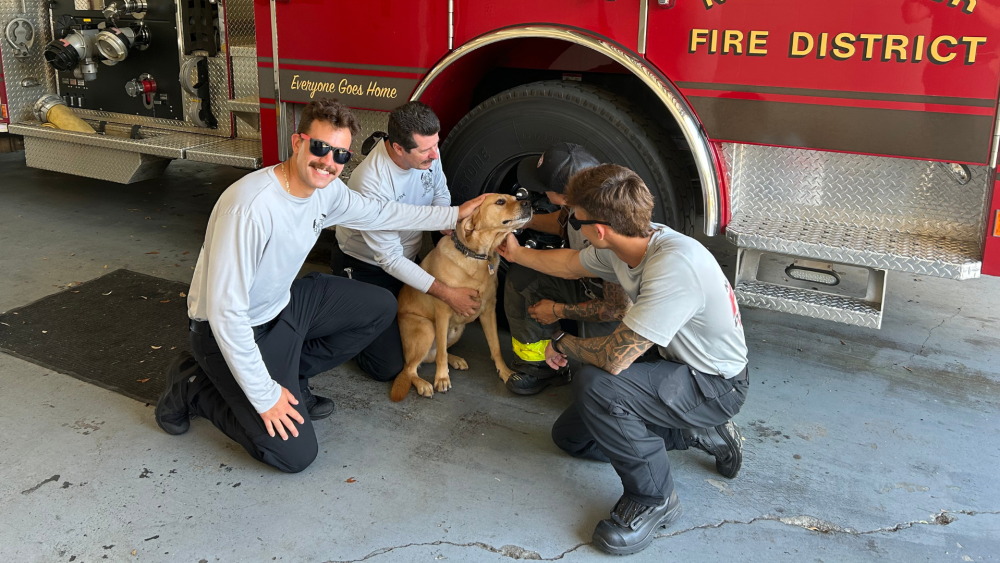There was a time in the not-too-distant fire service past when concern for firefighters’ mental health was less than an afterthought. The prevailing attitude was if you have trouble handling the stressors of the job, that’s your problem.
That was the past. But people like Joseph Sicking, chief of the North River (Florida) Fire District (NRFD), are determined to ensure it will not be the future.
An initiative for every need
The NRFD has compiled an impressive array of mental health resources, especially considering the size of the department – fewer than 80 members, including administrative staff. These services include an actively engaged fire department chaplain, a peer support team, free sessions with a healthcare professional of the employee’s choice for those experiencing acute mental or physical health issues, a contracted provider for mental health and substance abuse services, and even an in-house therapy dog.
The bolstering of mental health resources began in 2016 when NRFD entered a partnership with its current chaplain, Kelvin Foster, who Sicking said was a key player in all that came after.
“He’s the one who started making this big mental health push,” Sicking said. “It’s really all on him, and we just support him. We realized that things were working, and he was bringing us great new innovative ideas, and that continues today.”
In addition to other duties, Foster researches available mental health programs, both locally and nationwide, and vets potential resources for the department. Most recently, NRFD connected with the International Center for Addiction and Recovery Education (ICARE), an organization that develops programs to support the mental wellbeing among workers and mitigate potential substance misuse. ICARE provides services such as self-assessment tools, customized training for department leaders, and confidential data collection.
NRFD has had a peer support team for seven years, with members trained through the IAFF. The team assists with debriefings and other support services, both directly for department members and also as part of a regional network of teams.
And then there’s Drew, the NRFD therapy dog who has been a member of the department for the past two years. The department acquired Drew through Dogs Inc., an organization that trains and provides service dogs, with a focus on veterans. NRFD was the first fire department to reach out to them for a support dog.
“Everyone wants to see Drew,” Sicking said. “It’s been a great thing. He’s part of all our events.”
The chief also has a personal stake in Drew’s involvement with the department: “I, as the fire chief, actually bring Drew in every day, as he comes home with me. I’m the main facilitator with him.”
Making mental health support a cultural pillar
All these efforts have made a real impact on individual members and the department as a whole.
“The initiatives that have been implemented have been positively received by our members,” said Sicking. “One clear indicator of success is our notably low turnover rate. These programs have really contributed to breaking down barriers in accessing mental health care. I believe that the wellbeing of our people has been strengthened overall and the health of the organization is at a high level because of these programs.”
NRFD is a young department, with 22% of its members under 25. Investments in mental health resources is one way to both retain and recruit this new generation of members, Sicking said.
“We recognize the vulnerabilities with the younger firefighters who might feel overwhelmed early in their careers,” said Sicking. “If they lack support, we could lose them easily. We made it our priority to ensure their wellbeing early on. We want to make sure they know about these resources well ahead of time and we get them every bit of support they need, so we don’t have good firefighters leave the service. We’ve all seen that – when good people go because they don’t feel that they are supported in the way that they should be.”
Concern for mental health and wellbeing is front and center on the department’s website, including a tab for community mental wellness resources at the top of the home page.
In addition, Foster is creating a guidebook on “all things mental health and wellbeing, cover to cover,” Sicking said. Once completed, this book will be utilized within the department and potentially made available to the fire service community.
Sicking joined NRFD when he was still a teenager; 18 years later, he remains committed to seeing the department he now leads as a beacon for the future.
“We all remember the old days when you come on the department and you see some ugly things and maybe it affects you negatively. And the response would be: ‘Maybe you’re not cut out for this.’ That’s just the way it was. We are really trying to change that culture.”














